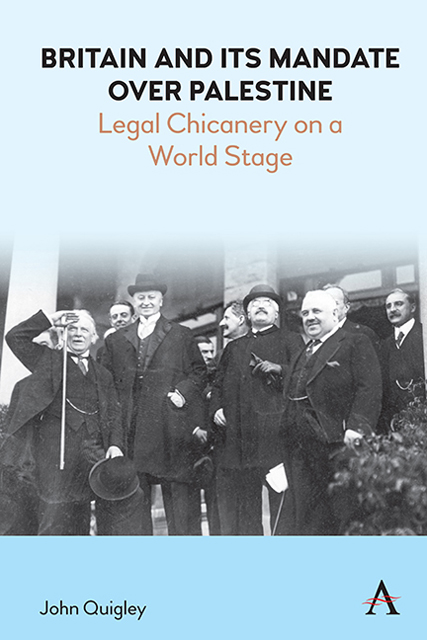Book contents
- Frontmatter
- Contents
- Preface
- Setting the Stage: Was Britain’s Rule in Palestine Legal?
- 1 The Balfour Declaration Is the Focal Point for the Legal Situation of Palestine
- 2 The Balfour Declaration Was a Binding Commitment to the Jewish People
- 3 The Jewish National Home Meant a Jewish State
- 4 The Balfour Declaration Was Issued to Affirm Jewish Rights in Palestine
- 5 The Paris Peace Conference Raised Jewish Statehood to the International Level
- 6 Britain’s Allies Made the Balfour Declaration an International Commitment
- 7 Britain’s Allies Endorsed Jewish Rights
- 8 Britain Took on Palestine Because of the League’s Mandate System
- 9 The League of Nations Protected Palestine’s Arab Population
- 10 Britain Was Given Palestine by the League of Nations
- 11 The League of Nations Put the Palestine Mandate into Legal Force
- 12 The Peace Treaty with Turkey Legalized Britain’s Status in Palestine
- 13 The Palestine Mandate Document Was a Treaty between Britain and the League
- 14 The League of Nations Required Britain to Implement the Balfour Declaration
- 15 The Palestine Mandate Document Implemented the League Covenant
- 16 The Palestine Mandate Document Recognized Jews as a National Group
- 17 The Palestine Mandate Document Bound Britain to the Balfour Declaration
- 18 The International Community Committed Itself to the Balfour Declaration
- 19 Britain Held Legal Status in Palestine
- 20 The United Nations Charter Carried Forward a Jewish Entitlement to Statehood
- Postscript: Why History Matters
- Documents Annex
- Notes
- Bibliography
- Index
9 - The League of Nations Protected Palestine’s Arab Population
Published online by Cambridge University Press: 10 January 2023
- Frontmatter
- Contents
- Preface
- Setting the Stage: Was Britain’s Rule in Palestine Legal?
- 1 The Balfour Declaration Is the Focal Point for the Legal Situation of Palestine
- 2 The Balfour Declaration Was a Binding Commitment to the Jewish People
- 3 The Jewish National Home Meant a Jewish State
- 4 The Balfour Declaration Was Issued to Affirm Jewish Rights in Palestine
- 5 The Paris Peace Conference Raised Jewish Statehood to the International Level
- 6 Britain’s Allies Made the Balfour Declaration an International Commitment
- 7 Britain’s Allies Endorsed Jewish Rights
- 8 Britain Took on Palestine Because of the League’s Mandate System
- 9 The League of Nations Protected Palestine’s Arab Population
- 10 Britain Was Given Palestine by the League of Nations
- 11 The League of Nations Put the Palestine Mandate into Legal Force
- 12 The Peace Treaty with Turkey Legalized Britain’s Status in Palestine
- 13 The Palestine Mandate Document Was a Treaty between Britain and the League
- 14 The League of Nations Required Britain to Implement the Balfour Declaration
- 15 The Palestine Mandate Document Implemented the League Covenant
- 16 The Palestine Mandate Document Recognized Jews as a National Group
- 17 The Palestine Mandate Document Bound Britain to the Balfour Declaration
- 18 The International Community Committed Itself to the Balfour Declaration
- 19 Britain Held Legal Status in Palestine
- 20 The United Nations Charter Carried Forward a Jewish Entitlement to Statehood
- Postscript: Why History Matters
- Documents Annex
- Notes
- Bibliography
- Index
Summary
The Crown, in its announcement of Britain's intentions, promised fairness to Palestine's population. “I desire to ensure you of the absolute impartiality with which the duties of the Mandatory Power will be carried out and of the determination of my Government to respect the rights of every race and creed represented among you, both in the period which has still to elapse before the terms of the mandate can be finally approved by the League of Nations and in the future when the mandate has become an accomplished fact.”1 King George did not explain why there was a time period that “has still to elapse” before approval of terms by the League of Nations. His statement was apparently aimed at rationalizing the onset of a mandate without consultation with the League of Nations.
The phrasing about League approval was likely lost on most listeners. The Crown did not say that approval would be sought for the mandate, but only for its “terms.” The mandate itself would not be up before the League for approval. Britain had already been appointed, by its lights, by the Allies. So the League could not keep Britain from claiming to govern by a mandate. If the mandate was not conferred by the League, a listener might have wondered, did the League have any control over how Britain might choose to govern?
Even the “terms,” however, would not depend on the League. Britain did plan to seek the League Council's approval of a mandate document it was drawing up that would recite “terms.” The Covenant did not require approval of the “terms.” Members of Parliament who opposed the Balfour Declaration put uncomfortable questions to the Government. One question posed in 1920 was, “Will the League of Nations have anything to say to these terms; can they disregard them after they are decided by the Government?” Cecil Harmsworth, Under-Secretary of State for Foreign Affairs, avoided giving an answer. As we shall see shortly, the Foreign Office would not let the League second-guess the “terms.” Under the Covenant's Article 22, paragraph 8, the prerogative of the League Council ran only to terms that related to the degree of authority a mandatory expected to wield, and then only if the mandatory itself failed to explain the degree of authority.
- Type
- Chapter
- Information
- Britain and its Mandate over PalestineLegal Chicanery on a World Stage, pp. 59 - 66Publisher: Anthem PressPrint publication year: 2022

